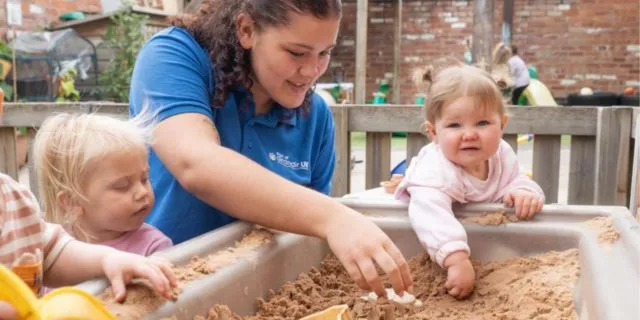Blog
Can my child go to nursery with a cold? Nursery sickness policy UK explained
Blog

When your child wakes up with a sniffle, a mild cough, or seems a little more tired than usual, it can be difficult to know what to do next. Should you send them to nursery as normal, or is it best to keep them at home to rest?
For parents, these moments often bring uncertainty. However, understanding the standard nursery sickness policy in the UK can make these decisions much easier. While each setting may have its own procedures, all nurseries share one goal: to protect the well-being of every child, family, and staff member.
The importance of nursery sickness policies
A clear sickness policy helps nurseries manage infections and reduce the spread of contagious illnesses. With lots of children time together in close proximity, germs can travel quickly, so it’s important that nurseries act promptly when a child becomes unwell.
Such policies also ensure that each child’s individual health needs are supported, whether that means monitoring a mild temperature, administering prescribed medication, or responding appropriately to a more serious condition.
Nurseries such as Grandir UK nurseries follow guidance from Public Health England and other relevant authorities. This ensures that all procedures, from recognising symptoms to setting exclusion periods are consistent with national standards.
When should children stay at home?
In most cases, a mild cold or cough doesn’t mean your child has to miss a day of nursery. If they seem well in themselves and can comfortably take part in the full range of indoor and outdoor activities, they can usually attend as normal.
However, it’s best to keep your child at home if they have any of the following symptoms:
- A fever or high temperature
- Vomiting or diarrhoea – children should remain home for 48 hours after the last episode
- A rash or blisters that could signal a contagious illness, such as chickenpox, impetigo, or hand, foot and mouth disease
- Cold sores or ringworm, which can easily spread through shared items like cups or towels
- Scarlet fever, measles, mumps, or rubella, where government guidance recommends specific exclusion periods
- Conjunctivitis, where the eyes appear red, sore, or have discharge
Any illness requiring antibiotics or a new medication – nurseries often ask that children stay home for at least 24 hours after the first dose to ensure the treatment is effective and the child is no longer infectious
If a child is too unwell to join in, needs constant care, or appears unusually drowsy, staff may need to refuse admission for the day, not as a punishment, but to protect the well-being of your child and others.
How nurseries act when a child becomes unwell

If a child becomes unwell during the day, the Nursery Manager or senior member of staff will assess their condition. Parents will be contacted to collect their child if they appear unable to take part in activities or show symptoms of a contagious illness.
Supporting recovery and a safe return
In some cases, nurseries may ask for confirmation that your child has completed their medication or that any visible sores, rash, or blisters have healed. This ensures your child’s return doesn’t pose a risk to others and that they’re truly ready to resume normal activities.
Good communication between families and nursery staff is key. Keeping the nursery informed about any changes to your child’s health or treatment, and sharing advice from your GP, helps staff respond appropriately and provide the care your child needs.
Working together to protect every child
Nurseries and parents share the same priority: keeping every child safe, comfortable and well cared for. Following sickness procedures, acting promptly when illness appears, and allowing time for rest all contribute to a healthy, happy nursery community.
By following national guidance, communicating openly, and trusting your Nursery Manager’s advice, you help ensure that all children attending are protected, and that your child can return to nursery feeling their best.
For more information on how nurseries manage illness, you can view Grandir UK’s full Medicine and Illness Policy or speak directly with your Nursery Manager for tailored advice and support.









